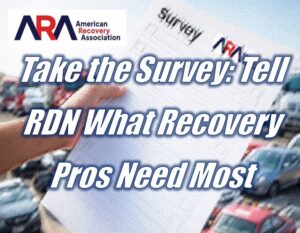 Personal Property….IT’S MINE!
Personal Property….IT’S MINE!
Guest Article
We have been told that the number one complaint lodged against collateral recovery specialists are allegations of missing personal property. I have been involved in providing opinions in numerous law suits involving self-help repossessions and none of them involved such allegations. However, since this is apparently a serious issue I am submitting this article in hopes that it may clarify the importance and accepted methods of the proper handling of personal property contained in a vehicle at the time of repossession.
There is sufficient predominate repossession case law addressing the process and importance of properly inventorying, storing and release or disposal of personal property should the debtor elect not to redeem personal property. In those few states that have a specific law regulating the licensure and oversight of those who service self-help repossession assignments there are specific, statutory requirements for this process.
For those who service repossession assignments in states that do not have specific, statutory requirements for handling personal property following are some predominate repossession case law that addresses this issue.
Perhaps the most notable case law in this areas is Larranga v. Mile High Collection & Recovery Bureau (807 F. Supp. 111 NM 1992). Larranga sued for conversion because there was personal property inside the vehicle at the time of repossession. Since the contract signed by the Plaintiff did not include a clause consenting to the taking of personal property in the vehicle at the time of repossession, the court affirmed the Plaintiff’s claim. Now creditors have included a “consent” clause in their contracts.
GMAC v. Vincent (523 83 2d 539 183 OK 547 Sup. Ct. 1938) was an important case in that it a claim of conversion was denied by the court because of the “consent” clause which stated, “Seller may take possession of any other property in the above described motor vehicle at the time of repossession and hold same temporarily for purchaser without liability on the part of the seller.” The court went on to there would not be a wrongful taking of the personal property, but the failure of the Defendants to account to Plaintiff for the property upon his demand therefore would constitute an unlawful exercise of dominion over the same. Accordingly, Defendants would be liable to Plaintiff for the actual case value of the personal property which was in the automobile at the time of the taking and for which Defendants failed to account to Plaintiff.
Another important case regarding the handling of personal property is Nadalin v. Automobile Recovery Bureau, Inc. (169 F. 3d 1084 U.S. Court of Appeals, Seventh Circuit IL 1999). This case involved a charge for personal property that was in the Nadalin vehicle at the time of repossession. The repossession agent inventoried and stored the personal property then contacted Nadalin and advised him there would be a $25.00 charge to redeem the property. Nadalin sued, alleging a violation of the FDCPA and asserting that this was an effort to “claim and seize additional collateral for the loan.” The court denied the claim stating, in part, “A secured creditor who repossess the collateral for his loan is entitled to the recovery of reasonable expenses of collecting the loan, which might include expenses of preserving and returning the incidental personal property of the debtor.” The court went on to say that the Security Agreement between the creditor and debtor authorized (consent clause) the creditor to take “any goods found in the vehicle not covered by the Agreement at the time of repossession, provided that the lender makes reasonable efforts to return them to the debtor after repossession.”
These cases make it clear that:
- The contract between the creditor and the debtor should contain a consent clause. This is a responsibility of the creditor.
- The personal property contained in the vehicle at the time of repossession should be immediately inventoried (preferably by the recovery agent who performed the repossession) showing date and time of the inventory and signed by the person who completed the inventory.
- The personal property must be protected.
- The debtor must be notified in a timely manner and method of redeeming the personal property and given a reasonable time period for redemption.
- A “reasonable” fee may be charged to the debtor for this service.
As you can see, predominate case law in this area is clear and easy to understand. The C.A.R.S. National Certification Program contains a very specific procedure for the inventory and storage of personal property, timely notification to the debtor, redemption process including reasonable charges and a reasonable time the personal property will be held, and the disposal of such property should the debtor elect not to redeem. The C.A.R.S. process follows Chapter 493, Florida Statute and has been tested in both state and federal court.
 About RISC
About RISC
RISC is an organization dedicated to providing services specific to the collateral recovery industry, including the professional training and certification of collateral recovery specialists. RISC Educational Systems is our State licensed (Florida) training subsidiary that specializes in the development of professional certification curriculums, continuing education, Industry Standards and compliance training, monitoring and reporting. . RISC is an advocate of all professional practitioners within the collateral recovery industry.
Joe Taylor
Vice President
Director of Education
RISC











More Stories
Today is Fallen Agents Day – 2026
From Auction Cutting to Field Programming: The Structural Shift No One Budgeted For
Bad Apples in the Repossession Industry
Why Self-Help Repossession Is Taken for Granted — and Why Losing It Would Hurt Consumers Most
A Necessary Distinction: Financial Oversight vs. Financial Control
When Oversight Becomes Overreach: Why Demanding Subcontractor Financials Is Wrong